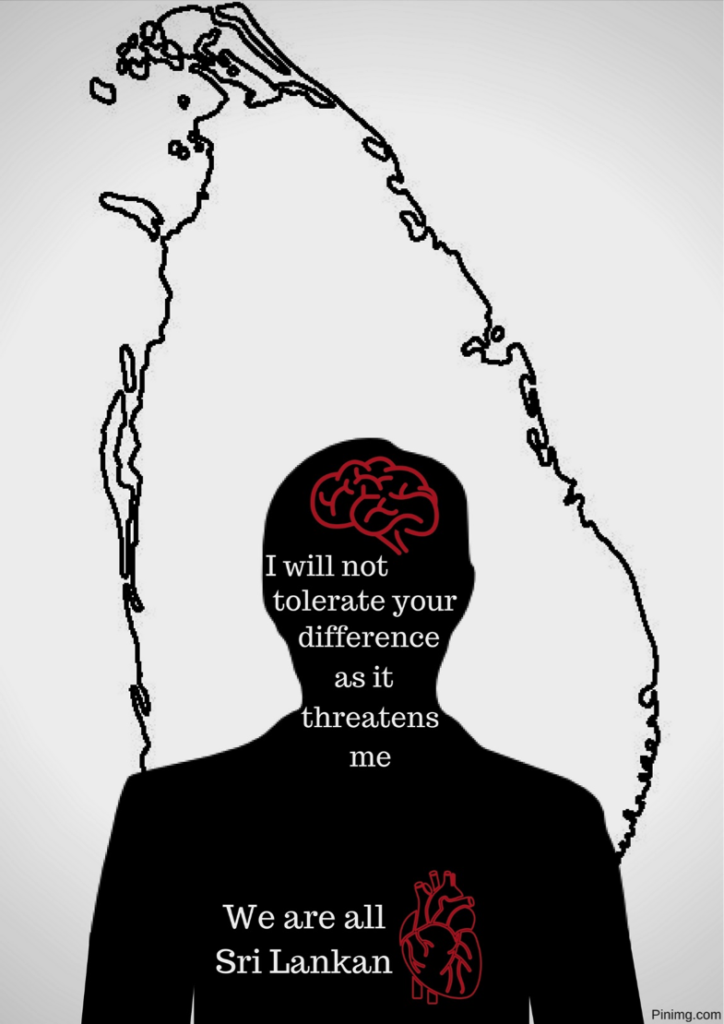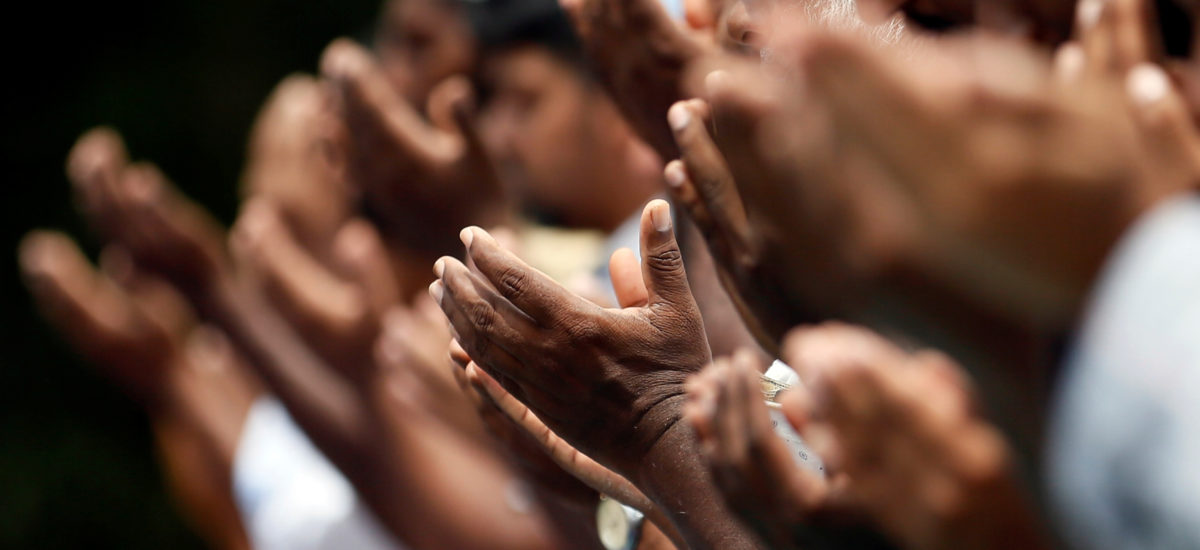Featured image courtesy Reuters/Dinuka Liyanawatta
In the aftermath of further ethno-religious violence in Sri Lanka, stories are shared and explanations attempted, with each person trying to make sense of what is happening around them. People dwell on how ‘in the good old days’ everyone lived together peacefully. The meme ‘Keep Calm We are all Sri Lankan”[1] is shared on social media in the hopes of reminding each other that we are united. That what has happened has been a sort of nightmare we can all wake up from. There is general discourse on how Sri Lanka is a multicultural nation, with many different people living together in peace, and how ultimately we are all one Sri Lankan family.

Infographic by Sakeena Razick
This idea of a united ‘Sri Lankan’ identity is presented as the central narrative of relations between different identity groups within the country, particularly, as is the focus of this article, between Sinhalese Buddhists and Muslims. Yet, Sinhala-Muslim tensions outside of the North and East[2] and particularly on recent incidents of anti-Muslim violence contribute to a counter-narrative that contradicts this.
These opposing narratives of Sinhala-Muslim relations are reflected in conversations in everyday life. On the one hand, it is said ‘I have many Muslim friends. At Avurudu I share food with them and then at Ramazan they share food with me. We always celebrate our different festivals’. On the other hand, it is also quite normal to hear ‘Sinhalese Buddhists have been pushed to the limit. Why are these Muslims being treated differently?’ or ‘Why should we have to pay extra to buy products that are Halal certified?’
The claim that all individuals in Sri Lanka live together in harmony, despite their differences, is shattered, when in reality, differences between Sinhala and Muslim identity groups have become a focal point. It is in this context that it becomes necessary to investigate how and when such differences between identity groups are viewed. This involves questioning the setting in which a dominant ‘norm’ identity is revered as opposed to an ‘other’ identity. The latter is perceived as inferior to the former, and one that must therefore be subject to control.
Perry, in her criminological theory looks at ‘doing difference’ appropriately and inappropriately and analyses how this is linked to the perpetration of hate crime. According to Perry, ‘doing difference’ appropriately occurs when an individual or group performs their identity in conformity with the dominant norm identity. This ensures that the differences of a particular group, the ‘other’ identity, does not infringe upon the dominant ‘norm’ identity and upholds the existing social hierarchy. Where an individual or group performs their identity by crossing the boundaries that exist to uphold the dominant norm identity there is then ‘doing difference’ inappropriately and existing power relations are threatened. In this situation the differences of the ‘other’ identity infringe upon the dominant ‘norm’ identity.
Where there is ‘doing difference’ inappropriately there is thus a threat to the norm and fear of loss of dominance by the dominant identity group. This threat to dominance may then lead to the necessity for action to reinforce previous power relations that existed. It is in this context that there is the perpetration of violence by the dominant identity group which targets the ‘other’ identity group as a response to fear of loss of supremacy.
It may be proposed that on the assumption that the dominant ‘norm’ identity in Sri Lanka is that of being Sinhalese Buddhist, it is apparent that numerically minority communities, such as the Muslims, are thus placed in the position of ‘the other’ and then expected to perform their identity[3] in a manner that preserves existing relations of power which ensure that Sri Lanka continues as a Sinhala Buddhist nation. However, where the performance of Muslim identity threatens the norm of the ‘Sinhala Buddhist’ identity in instances of ‘doing difference’ inappropriately, it is then that the vulnerability of the Muslim community to violence and loss of life and damage to property[4] is exacerbated. It is in those circumstances that there is perpetration of hate crime against Muslims with the aim of reminding such community of their ‘place’ within the nation.
On the one hand, conformity with the general law of the country and its general banking standards and general standards for certification of food by the Muslim community may be viewed by the Sinhalese Buddhists as ‘doing difference’ appropriately. On the other hand, one of the instances of ‘doing difference’ inappropriately may be interpreted by the Sinhalese Buddhists as Muslim insistence on Halal certification of products. While Halal certification is upheld as a necessity for the Muslim community; it has been argued that this imposes a heavier financial burden on the consumer and as the general consumer is a Sinhalese, for whom it is not a necessity to have a Halal certified product, the Halal certification should be banned completely. The continuation of the Halal certification process, is perceived as an impediment[5] to the way things ought to be in a typically Sinhala Buddhist nation where no Halal certification would be necessary.
Where it is argued that the series of acts of ethno-religious violence against Muslims is the result of non-compliance by the Muslim community with the Sinhala Buddhist norm it may be suggested that these acts cannot be viewed as isolated, extremist acts that do not reflect the will of most of the Sinhala Buddhists. On the contrary it may be argued that the majority of the Sinhala Buddhist identity group may approve of these acts of violence and hate against Muslims who do not comply with the Sinhala Buddhist norm. It is this interpretation that may then explain the silence of the majority of Sinhala Buddhists over acts of violence and hate. This silence is often explained as apathy; the unfortunate result of decades of war and yet when it relates to issues of the economy or corruption, members of the general public may be quite vociferous. The silence of the majority of Sinhala Buddhists may thus be seen as implied approval of the reassertion of the dominance of the Sinhala Buddhists in a Sinhala Buddhist nation.
The inability and unwillingness by the Sinhalese Buddhist, as the dominant identity group, to tolerate differences that challenge the norm, will continue to cause tension and violence, unless differences are perceived not as a threat but as an opportunity to question and redefine the norm. Is Sri Lanka actually a multi-religious and multicultural nation or a Sinhala Buddhist nation? If it is a Sinhala Buddhist nation then what are the principles of such a nation with regard to the relationship between the Sinhala Buddhist identity group and other identity groups? Where other identity groups seek to challenge the Sinhala Buddhist norm what is the response of the Sinhala Buddhists? Is it one rooted in dialogue and collaboration or in violence?
Ultimately, Sri Lanka is faced with several choices. Do we continue to wear our ‘Sri Lanka tinted spectacles’ and live together with our brother as our enemy? Or do we recognise our brother’s role within our family, while questioning, what it really means to be a family?
Footnotes:
[1] Roar life, ‘We are all Sri Lankan’ meme, 7th March 2018.
[2] Vijay Nagaraj and Farzana Haniffa, An ICES publication, Towards Recovering Histories of Anti-Muslim Violence in the Context of Sinhala Muslim Tensions in Sri Lanka, 2017, as accessible at: http://ices.lk/wp-content/uploads/2018/03/ICES-Toward-Recoverig-Histories-Book-WEB-2.pdf.
[3] Mark Walters, A General Theories of Hate Crime? Strain, Doing Difference and Self Control, 2010; as accessible at: www.academia.edu/4948229/A_general_theories_of_hate_crime_Strain_doing_difference_and_self_control
[4] Gulf News, Tariq A.Al Maeena, Neo-fascism on the rise in Sri Lanka, 23rd February 2013, as accessible at: http://gulfnews.com/opinion/thinkers/neo-fascism-on-the-rise-in-sri-lanka-1.1150052
[5] Sri Lanka Mirror, Bodu Bala Sena gives ultimatum to ban Halal certification, 18th February 2013, as accessible at: https://web.archive.org/web/20130222051222/http://www.mirror.lk/news/5366-bodu-bala-sena-gives-ultimatum-to-ban-halal-certification.
[6]. Daily FT, Dharisha Bastians, Bodu Bala Sena anti-Halal agitation to begin in Maharagama tomorrow, 16th February 2013, as accessible at: http://www.ft.lk/article/136214/Bodu-Bala-Sena-anti-Halal-agitation-to-begin-in-Maharagama-tomorrow.
[7]. Barbara Perry, Hate and Bias Crime: A Reader, 2003.

